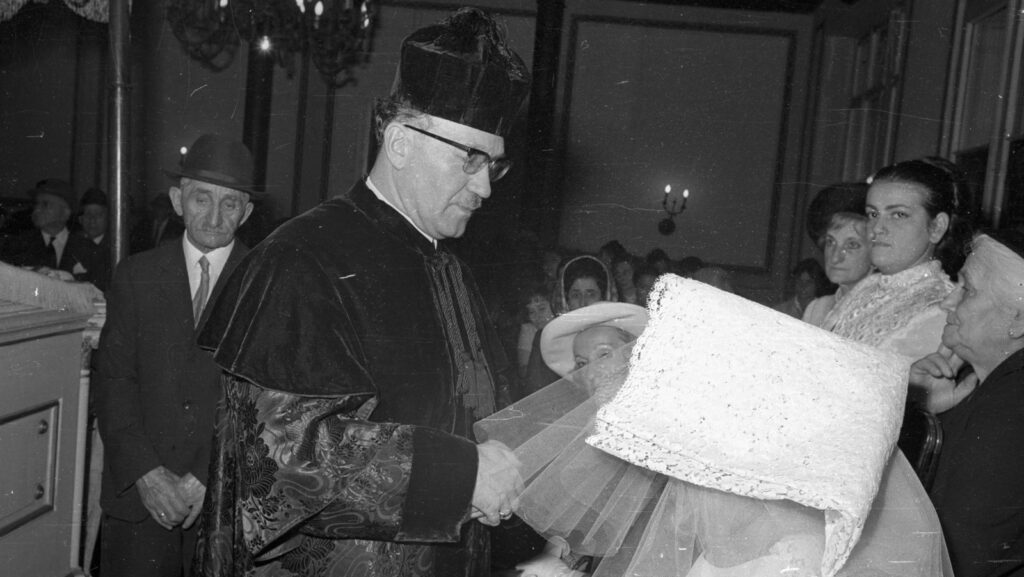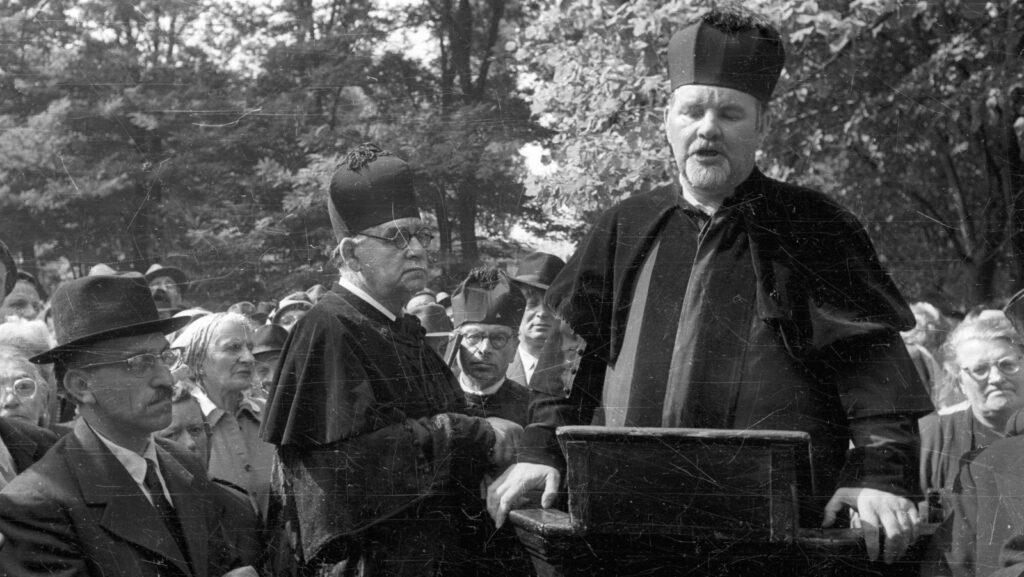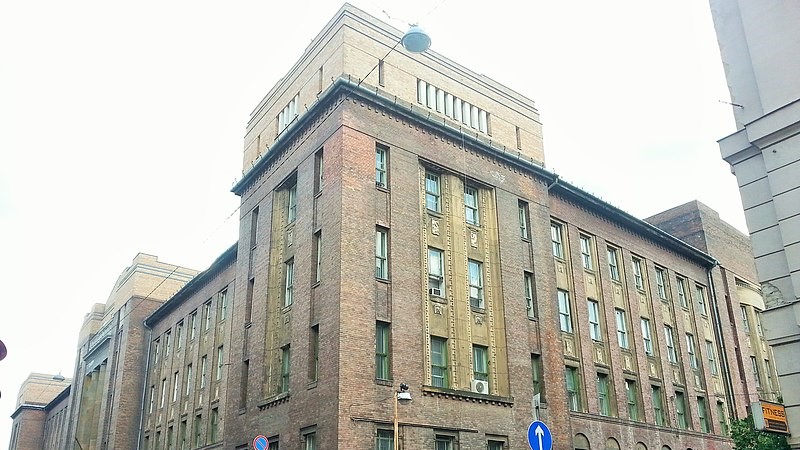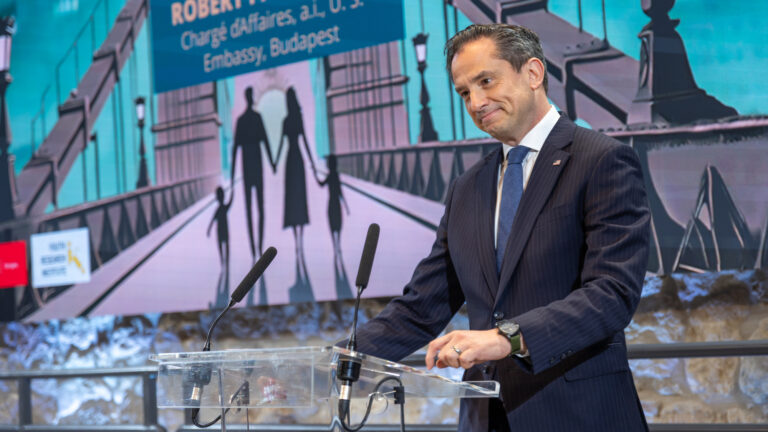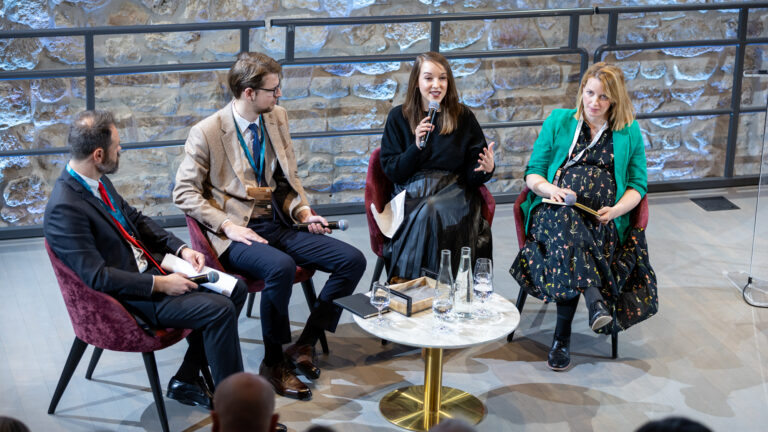Many years ago, my eyes caught a yellowing interview on the pages of the 1921 edition of the Zionist journal Zsidó Szemle (Jewish Review): ‘Ottokár Prohászka’s statement on Zionism’[1] was the title of the article, written by a Zionist youth writer working under a pseudonym, Irén Kellner. The text itself, as we will see below, is quite surprising: if we employ a black-and-white picture of the political movements of the last century, it is difficult to imagine that this kind of discourse could have taken place at all.
The political and public writing career of Ottokár Prohászka, the Catholic bishop of Székesfehérvár, has given rise to heated debates among historians, the root of which was primarily Prohászka’s antisemitism and his numerous statements against Hungarian Jews. The reason for the most serious criticism brought against the bishop is his writings and speeches about Judaism between 1919 and 1921: among them stand out his speech in the parliamentary debate on the numerus clausus law (which barred most Jewish students from attending university), and his later statements in support of it.
The fact that Ottokár Prohászka perhaps did not handle the Jewish national movement in accordance with today’s obvious “expectations”, that is he did not reject it out of visceral antisemitism, was already known in the literature. Church historian Csaba Fazekas highlighted in a study that although the bishop had the idea of supporting Zionism, it should not be treated as a sign of some kind of philosemitism or sympathy for Judaism.[2] The historian believes that the bishop’s logic was much simpler: he saw Zionism as a legitimate form of “getting rid” of the Jews.
In his speech during the debate on the numerus clausus, the bishop spoke at length about the fact that since Great Britain awarded the Holy Land to the Jewish people in 1917, the Jews already had their own “homeland”. According to Prohászka’s reasoning, anyone who wanted to could emigrate out of their own free will: ‘I believe that . . . among the Jews in Budapest and in Hungary in general, many do not even want to know about Zionism. […] It depends on the decision of each person whether he can maintain his loyalty to Hungary on the basis of complete faithfulness. . . but one can never claim that Zionism is foolishness.’[3]
‘I believe that . . . among the Jews in Budapest and in Hungary in general, many do not even want to know about Zionism’
Perhaps the antisemites of the time did not truly feel that this was a matter of the Jews’ individual decision. The interview given to Zsidó Szemle sheds new light on how seriously Prohászka thought about supporting Zionism. In a 1919 writing, the bishop already explained that, in his opinion, Jews should convert to Christianity, emigrate from Europe to Palestine and establish an independent national state there.[4] Additional information is provided by the interview conducted by the Zionist newspaper with Prohászka on the occasion of his speech during the debate on the numerus clausus law.
Prohászka spoke about how he considered the idea of complete assimilation to be acceptable on the domestic level. But if someone ‘wants to remain a Jew’, then he considered the path of Zionism to be the only one to follow: ‘I consider it impossible for a Jew to consider himself a good Jew and not be a Zionist at the same time. Because the statement that Judaism is not a nationality, but only a denomination, is actually absurd. . . . According to the oriental tradition. . . religion and nationality form an inseparable unit. One cannot leave the bond of the Jewish nation without leaving one’s religion at the same time, just as it cannot happen the other way around either. There are therefore two paths before Judaism: if it wants to remain Jewish, Zionism, if not, then unconditional assimilation. I confess that by assimilation I also mean leaving the religion, because without it the assimilation of the Jews would not be true and honest.’
Did Prohászka also demand emigration from those Jews who ‘want to remain Jews’? He also answered this question in his interview in which he stated that Zionism ‘does not mean that all Jews should immigrate to Palestine immediately. Where, and for what? Palestine still needs houses, development, roads, means of transport, proper life is still missing there, everything without which a cultured person cannot exist. And Jews, as a nationality, must not withdraw from Hungarian social life. In any case, we have to keep in touch with each other.’
To what extent can the above statements of Prohászka be considered a “pro-Jewish” opinion, or at least a favourable opinion of the Jewish people? In the last century, it was difficult to draw a clear line between those enthusiastic Christians who fancied the restoration of the Jewish state, and those antisemites who only wanted to “get rid” of the Jews – and let’s face it, sometimes this is still the case today.
The context of Prohászka’s lines makes it clear that the judgment of the American historian Charles Strozier may be true for him, according to which some Christian Zionists expressed their love for Zionism, while speaking insensitively about the collective conversion of the Jews, which would also mean the end of Judaism.[5] Bishop Prohászka also formulated the demand for collective compensation explicitly.
Prohászka voiced his respect for the religious tradition of Judaism
In the interview, Prohászka voiced his respect for the religious tradition of Judaism. He called the Jews ‘a people whose brilliant culture goes back thousands of years’, and then related that ‘every time I pick up the Book of Kings, there is a story that speaks more eloquently than volumes about the greatness of Jewish culture. During his wanderings, the prophet Elijah passed through a certain locality several times – I don’t remember the name – and he always stayed the night with the same married couple. The married couple had great respect for the prophet and tried to show their respect towards the man of God as much as possible. One day, when the prophet had already slept several times in their house, the woman said to her master: This man is a man of God, it would be fitting that we welcome you to our house with more respect. Let’s arrange a room for him, set up a place for him to lie down, put a candlestick and a jug of water next to him. This is what the story says, and this is remarkable for its time. After all, even today we can’t take care of a person in any other way if we really want to respect him?! So, for a people that can look back on such a history, that has had such traditions as, to mention only the last great national upheaval, the Maccabean wars, which dwarfs the military exploits of any other nation, it is impossible not to be attached to its past with all its heart and not seize every opportunity that helps to reconstruct it’.
Prohászka defended himself as follows in his interview with Irén Kellner: ‘I can only say that if I were a Jew, I would be a Zionist. . . And you see, I am considered antisemitic. Why would I be antisemitic? That’s not what I have in mind. Because I spoke in favour of the numerus clausus? I am a Hungarian and a Christian, is it not only natural that I represent the interests of Hungarians and Christianity?’
Perhaps his own apologetic remarks do not require a longer commentary, but it is much more interesting whether the Zsidó Szemle, as the largest Zionist newspaper at the time, accepted the bishop’s defense that he was not antisemitic and that the numerus clausus law meant “natural” self-defense. The answer is no. The Zsidó Szemle clarified that ‘the farthest thing is from us, of course, is to calm down or acquiesce in the exclusion of our Jewish youth from university’.[6]
Moreover, with the exception of this interview with Prohászka, the bishop’s appearances in the journal are exclusively negative. The paper criticized Prohászka even earlier, in September 1920, and attacked the bishop later in October and November 1922. In an editorial titled ‘Devour thy neighbour’, they criticized Prohászka’s thesis that neighbourly love was primarily a call to self-love.[7] In the same issue they ran another attack on the bishop,[8] and a month later they gave a succinct verdict on Prohászka’s defense that he does not practice antisemitism, but “philo-Christianism”: ‘The result is the same. Anti or philo: the end: hit the Jew!’[9]
Despite Ottokár Prohászka’s antisemitism, he showed interest and sympathy towards Zionism. In the light of his already known, one-sided statements, it is interesting to see that he was able to praise the Jewish tradition at length in an interview with a Jewish newspaper. Meanwhile, he also denied that he was antisemitic. However, all this did not change the anti-Jewish tone of his parliamentary speech in September 1920.
Yet, it is important to see that even during the early Horthy-period a strongly right-wing bishop could grant an interview to a Zionist journal where he could talk about his support for the Jewish national movement.
[1] For the full interview see: Irén Sass, ‘Prohászka Ottokár nyilatkozata a cionizmusról’, Zsidó Szemle, 11 February (1921), 2–3.
[2] Csaba Fazekas, ‘Prohászka Ottokár zsidóellenességéről’, Egyháztörténeti Szemle, 4 (2008), 133–155., https://www.uni-miskolc.hu/~egyhtort/cikkek/fazekas-prohaszka.htm, accessed 10 July 2022.
[3] ‘Prohászka Ottokár beszéde a Nemzetgyűlés 103. ülésén, 1920. szeptember 16-án’, Nemzetgyűlési napló, Vol. V (1920), 344–350.
[4] Ottokár Prohászka, ‘Die Judenfrage in Ungarn’, Das Neue Reich, (7 December 1919), 150–152.
[5] Charles B. Strozier, Apocalypse. On the Psychology of Fundamentalism in America (Beacon Press: Boston, 1994), 208.
[6] s. l. [probably Zionist lawyer Lajos Simon]: ‘Az egyetemi zsidókérdés’, Zsidó Szemle, (7 Sept. 1922), 1–2.
[7] ‘Fald fel felebarátodat!’, Zsidó Szemle, (13 Oct. 1922), 1.
[8] Cicero, ‘Prohászka és Hevesi’, Zsidó Szemle, (13 Oct. 1922), 3.
[9] ‘Anti és filo’, Zsidó Szemle, (24 Nov. 1922), 1.


